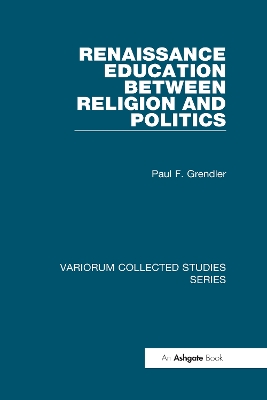Variorum Collected Studies
2 total works
CS 474
Books and schools were the foundation of the intellectual life of the Italian Renaissance. To study them, therefore, can give a clear insight into the culture of the period, both popular and learned, as is shown in this collection of articles. The opening studies examine popular works - in terms of physical appearance as well as content - then present accounts of Aldus Manutius (who abandoned teaching to become the leading scholarly publisher of the era) and of the libraries in which such books have been preserved (for instance, those of Erasmus). The following section deals with schooling, in the vernacular and in Latin, and looks in particular at the organization and curriculum of catechism schools, and the books they used. The final study then examines the background to the emergence of the University of Padua as the leading university of Europe.
Few eras took education so seriously or were so innovative in their approaches to schools and universities as the Renaissance. At the same time, religious and political concerns strongly influenced educational developments. This third volume of articles by Paul F. Grendler explores the close connections between education, religion, and politics at several levels and in different contexts. It combines detailed research into various kinds of schools with broad overviews of European and especially Italian education. The lead article compares Italian and German universities and assesses the impact of the Protestant Reformation on the latter. Even Erasmus, the great critic of university theologians, felt the need to acquire a doctorate in theology and did so. In Italy, the new schools of the Jesuits and the Piarists taught boys and young men gratis, but not without opposition. Two articles deal with students, the consumers of education. While teachers and students were most directly involved in schools and universities, ecclesiastical and political authorities, including the leaders of the Republic of Venice, the subject of the final study, kept a watchful eye on them.

